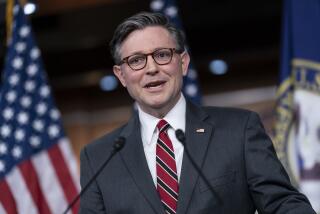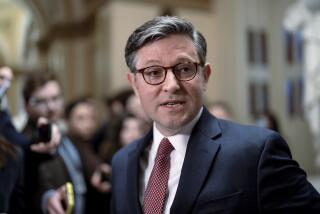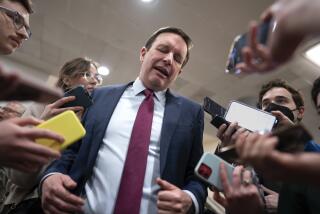Reagan Urged to Forgo Arms Pact : Byrd Indicates Democrats Would Bar Ratification of ‘Hasty’ Missile Accord
- Share via
WASHINGTON — Senate Majority Leader Robert C. Byrd (D-W.Va.), speaking for congressional Democrats, urged President Reagan on Saturday not to tie the hands of his successor by reaching an agreement with the Soviet Union on strategic arms reductions in the remaining months of his presidency.
Byrd made it plain that it would be next to impossible for Reagan to obtain Senate ratification of such an accord and, in any event, the Democrats do not want him to reach such an agreement with the Soviet Union before he leaves office in January.
“With a change of presidents on the horizon, I do not believe it would be wise to lock the next President into a hasty agreement, be he a Republican or a Democrat,” said Byrd in a radio speech for his party, responding to Reagan’s regular weekly radio talk Saturday.
On Friday, after leaving his summit meeting with Soviet leader Mikhail S. Gorbachev, Reagan had suggested that his Administration might still reach agreement on a strategic arms reduction treaty (START) that would reduce the superpowers’ long-range nuclear missiles and bombers.
‘Within Our Grasp’
“Such a treaty, with all its implications, is still within our grasp,” the President declared. In his Saturday broadcast, Reagan again appeared to hold out some hope for a START accord, saying that he and Gorbachev had “moved ahead” in the negotiations over such a pact during last week’s summit.
In his broadcast response, the Democratic majority leader, who went to Moscow last week to attend the signing of the Intermediate-range Nuclear Forces (INF) Treaty, twice made critical references to the summit and suggested that such sessions are not the best setting for arms-control negotiations.
“There’s no substitute for the painstaking work by our negotiating experts in Geneva,” Byrd said. “ . . . With arms control agreements, the devil is always in the details. That’s why it would be unwise to rush negotiations on START. Headline-grabbing summits are one thing, but rushing to meet a deadline on a treaty as important as START would be irresponsible. . . .”
He added: “Now may be a good time to reduce the fanfare of the summit and let the negotiators do their important work in private.”
In general, Reagan appeared to be putting a more optimistic cast on his meetings with Gorbachev than either the Democrats or some of his own aides and advisers have done.
In his Saturday radio talk, the President characterized last week’s meetings as “historic.”
Meet With Dissidents
“If anyone had suggested, even as recently as 10 years ago, that an American President would one day be able to meet with Soviet dissidents inside Moscow itself or be able to speak to Soviet students in their own university about human freedom, well I think you’ll agree that a prediction like that would have been dismissed,” he said.
“But this past week, it happened. Seeds of freedom and greater trust were sown, and I just have to believe that in ways we may not even be able to guess, those seeds will take root and grow.”
By contrast, one senior White House official who accompanied Reagan to Moscow suggested after the session’s end that the achievements at this summit may not have been great. “If we’re going to start having summits every six months or every year, which I think is good, you can’t run it like a World Series. You can’t expect it to be big every time,” he said.
This official acknowledged that the agreements signed in Moscow were “peanuts,” if considered individually and by comparison with the long-range arms limitation treaty that is under negotiation. The value of these and other agreements signed with the Soviets over the past years, he said, was that “you’re slowly building a relationship of trust.”
Speaking for the Democrats, Byrd described the value of the Reagan-Gorbachev meeting in cool terms.
“Summit meetings are valuable in forging a better understanding between the American and Soviet peoples,” he said. “President Reagan received unprecedented exposure.” He did not say whether he was referring to exposure in the Soviet Union or in the United States.
Times staff writer James Gerstenzang contributed to this story.
More to Read
Get the L.A. Times Politics newsletter
Deeply reported insights into legislation, politics and policy from Sacramento, Washington and beyond. In your inbox twice per week.
You may occasionally receive promotional content from the Los Angeles Times.










